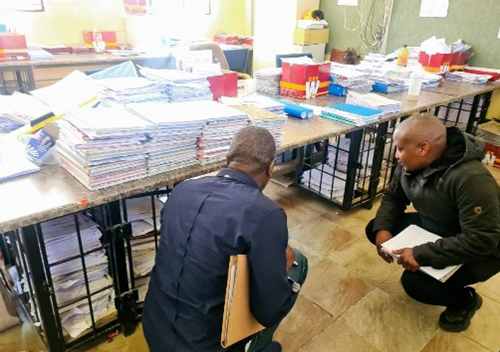In a 4IR world, the North-West University (NWU) is ensuring that learners at disadvantaged schools are not left behind and have the tools and knowledge to meet the challenges of the ever-changing world of work.
To this end, the Faculty of Education at the NWU’s Mahikeng Campus has initiated a community project, “A service-learning project for schools’ pedagogical integration of ICTs”.
The project is aimed at integrating information and communication technologies (ICTs) in classrooms for teaching and learning purposes. The project proposes to address the inequalities in South African classrooms, particularly in North West, where public schools in poorer communities lack access to ICT resources and teachers lack technological knowledge and technological pedagogical knowledge.
The goals of the project include equipping the NWU’s pre-service teachers and in-service teachers with technological knowledge, bridging the digital inequality in schools and improving teaching and learning practices through ICT integration.
This project aims to achieve various outcomes, such as practical knowledge gained by applying teaching strategies, the design and presentation of innovative lessons that integrate ICT, the ability to integrate ICTs in the classroom, proposing best practices, reflecting on teaching experiences and analysing and improving pedagogies.
The objectives include facilitating ICT integration in teaching and learning, providing ICT resources to schools, promoting innovative pedagogies, training students and teachers in basic ICT skills and integration, introducing learners to basic computer skills and using the project for research.
According to Dr Shepherd Mlambo, a lecturer in computer science education in the School of Mathematics, Science and Technology Education, the project has received initial donations of 25 HP Compaq Pro 6300 computers from the NWU and has identified two schools, Bodibe Secondary School and Tetlano Secondary School, to pilot the project.
“Progress has been slow due to various challenges, including competing needs in schools, limited finances and necessary infrastructure upgrades. The project aims to change the mindset of principals and teachers and to gradually expand its reach,” he explains.
The immediate plan for the schools, says Dr Mlambo, is to set up the donated computers, integrate open-source educational resources and establish classroom sites using open-source learning management systems.
“The project acknowledges the needs and preferences of teachers, and future plans include expanding to more schools, conducting needs analyses, reflecting on the effectiveness of the project, recruiting more teachers and seeking additional resources,” he adds.
He says the sustainability of the project relied on the university's social responsibility to allocate retired computers to community projects. Once the project is firmly established, the intention is to approach various corporate entities for donations of resources and support.
Dr Mlambo also acknowledges colleagues who have contributed to the project. They include Bibi Bouwman, director for sustainability and community impact, Dr Elize Küng, deputy dean for community engagement and stakeholder relations in the Faculty of Education, and Lester Mpolokeng, manager in the office of the deputy vice-chancellor for community engagement and Mahikeng Campus operations.

Dr Shepherd Mlambo and Thabang Motaung, a teacher at Bodibe Secondary School, inspect the computer room that is to be revamped for the project.

The NWU's generous donation of computers brings boundless possibilities to identified schools.
